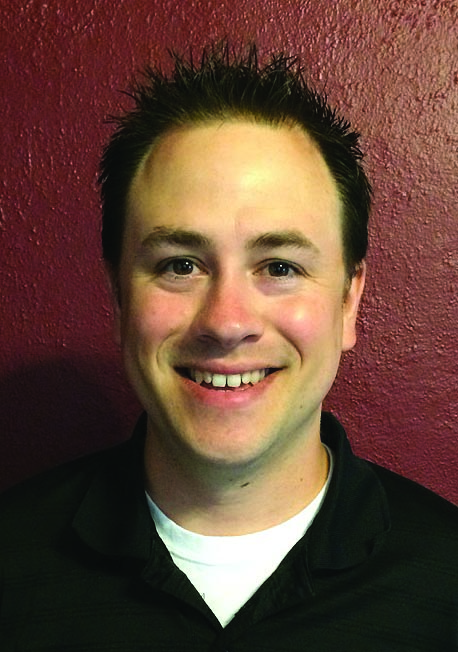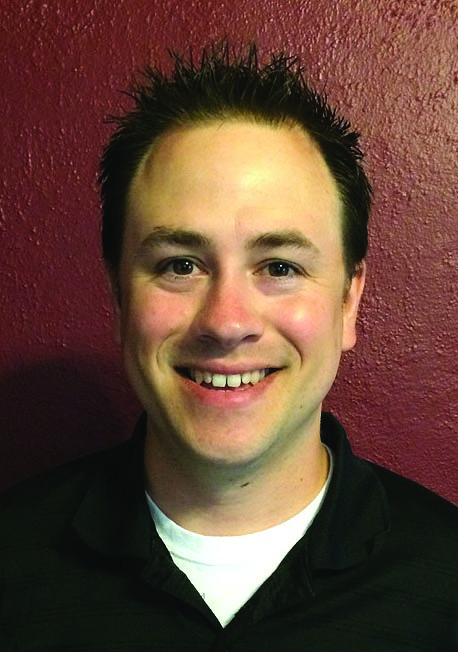 Nostalgic memories seem to keep Platte County’s Civic Center standing, and after viewing the inside of the former Platte City High School, that explanation remains as plausible as any.
The City of Platte City offered tours of the partially vacated building this past weekend, and I received one from Mayor Frank Offutt, who whisked me and a resident through the corridors providing his own recollections of time spent in the building as a student. There wasn’t much to see.
Most of the old classrooms and offices were vacant, save for a few used for miscellaneous storage.
The only thing left in the oldest portion of the building — the east wing and former home of the Platte City Police Station — isn’t tangible. There’s good reason why city administrator DJ Gehrt and other officials have cautioned against using anymore public money on the upkeep of a building fallen into disrepair.
That’s what made these tours so important.
People need to see that there’s obvious blemishes and little space. Holding onto a building steeped into Platte City’s history sounds romantic but seems to have very little practicality. The city plans to explore a potential private sector investor with the gymnasium, cafeteria, court room and parks and recreation offices still serviceable.
Even this idea seems a longshot, but credit to the officials for trying a way to save a landmark.
Eventually, residents will be asked to evaluate how much sentiment plays into how they want to spend money. Deciding the fate of the Civic Center will be the first chance to provide an indication of how the city will move forward in an effort to renovate, rebuild or construct its facilities, which average 75 years of age.
Shive Hattery — a Des Moines, Iowa architectural and engineering firm — recently provided a comprehensive study of the buildings’ conditions and outlined options.
There are fixes available to the Civic Center and public works buildings, but those are just 20-year fixes and would lead Platte City back to the same questions in another two decades. No matter what ends up chosen, cost should run between $3 and $5 million, so it’s not a matter of whether or not the money is spent but how much.
That starts with what to do with the Civic Center, which the city has utilized since the late 1990s.
The gymnasium portion receives regular use as a rental facility, and parks and rec maintains minimal office space there. Shive Hattery did offer a suggestion to keep that east portion but level the old police station, found to have structural failures and elevated radon levels in 2013, and build a larger reception area.
However, the city has maintained it doesn’t want to be in the reception business, leaving that possibility as more of a luxury than a necessity.
Signs point to pushing for consolidation with the current police station not providing nearly enough space for optimum functionality. The police station, city hall, municipal court and parks and recreation could share a building but that would likely require the city to purchase the old Platte-Clay Electric building on Main Street, level it and build a new potentially multi-story facility.
That seems to be the idea preferred idea to relocating east of Interstate 29 on the 30-plus-acre plot of land Platte City recently acquired with plans to develop it commercially in partnership with a private firm.
Public works facilities could also be a part of consolidation plans but would require a different locale — the site of Knighton’s Auto Body on First Street. That aligns with two of the three structures public works currently utilizes, but Gehrt has said the city would not actively pursue relocating a very recognizable business in Platte City but would listen if that interested Knighton’s ownership.
Knighton’s owner Luke Davis has had conversations with Gehrt about a potential sell but only to discuss the basics of the situation. Davis said he would be open to the idea if financial terms could be reached, and he could find a different location within city limits to reopen the business.
The other intriguing possibilities of new facilities leave the Civic Center with a very uncertain future, and the building could be demolished at some point with no structure to replace it.
However, a civic center could still have use in the community and could remain a possibility in conjunction with another looming project. The Platte City pool will reach the end of its recommended usage in a few years, and a survey showed citizens almost equally split between closing it, renovating it to increase its lifespan another 10 years and building a new one.
The last option would be the most expensive and would only come with another show of voter approval to provide the funds, likely in excess of $2 million.
But if the Platte County R-3 school district puts a new tax levy on a ballot soon and if that measure passes, there could be a new elementary school in town. If so, the city could look into purchasing the land Rising Star Elementary currently occupies to provide an ideal site for a new community pool and civic center.
Gehrt said that would seem to make a lot of sense, but there’s plenty more to be decided before entertaining that idea.
The odyssey to decide the future of Platte City’s government facilities has just begun. There’s plenty of “ifs” in any scenario for the inevitable major changes, but the process starts with determining the fate of the old high school and one of the city’s most recognizable buildings.
Without an outside investor, the only real option might be decommissioning a relic of the past while realizing the memories can be kept alive elsewhere.
Nostalgic memories seem to keep Platte County’s Civic Center standing, and after viewing the inside of the former Platte City High School, that explanation remains as plausible as any.
The City of Platte City offered tours of the partially vacated building this past weekend, and I received one from Mayor Frank Offutt, who whisked me and a resident through the corridors providing his own recollections of time spent in the building as a student. There wasn’t much to see.
Most of the old classrooms and offices were vacant, save for a few used for miscellaneous storage.
The only thing left in the oldest portion of the building — the east wing and former home of the Platte City Police Station — isn’t tangible. There’s good reason why city administrator DJ Gehrt and other officials have cautioned against using anymore public money on the upkeep of a building fallen into disrepair.
That’s what made these tours so important.
People need to see that there’s obvious blemishes and little space. Holding onto a building steeped into Platte City’s history sounds romantic but seems to have very little practicality. The city plans to explore a potential private sector investor with the gymnasium, cafeteria, court room and parks and recreation offices still serviceable.
Even this idea seems a longshot, but credit to the officials for trying a way to save a landmark.
Eventually, residents will be asked to evaluate how much sentiment plays into how they want to spend money. Deciding the fate of the Civic Center will be the first chance to provide an indication of how the city will move forward in an effort to renovate, rebuild or construct its facilities, which average 75 years of age.
Shive Hattery — a Des Moines, Iowa architectural and engineering firm — recently provided a comprehensive study of the buildings’ conditions and outlined options.
There are fixes available to the Civic Center and public works buildings, but those are just 20-year fixes and would lead Platte City back to the same questions in another two decades. No matter what ends up chosen, cost should run between $3 and $5 million, so it’s not a matter of whether or not the money is spent but how much.
That starts with what to do with the Civic Center, which the city has utilized since the late 1990s.
The gymnasium portion receives regular use as a rental facility, and parks and rec maintains minimal office space there. Shive Hattery did offer a suggestion to keep that east portion but level the old police station, found to have structural failures and elevated radon levels in 2013, and build a larger reception area.
However, the city has maintained it doesn’t want to be in the reception business, leaving that possibility as more of a luxury than a necessity.
Signs point to pushing for consolidation with the current police station not providing nearly enough space for optimum functionality. The police station, city hall, municipal court and parks and recreation could share a building but that would likely require the city to purchase the old Platte-Clay Electric building on Main Street, level it and build a new potentially multi-story facility.
That seems to be the idea preferred idea to relocating east of Interstate 29 on the 30-plus-acre plot of land Platte City recently acquired with plans to develop it commercially in partnership with a private firm.
Public works facilities could also be a part of consolidation plans but would require a different locale — the site of Knighton’s Auto Body on First Street. That aligns with two of the three structures public works currently utilizes, but Gehrt has said the city would not actively pursue relocating a very recognizable business in Platte City but would listen if that interested Knighton’s ownership.
Knighton’s owner Luke Davis has had conversations with Gehrt about a potential sell but only to discuss the basics of the situation. Davis said he would be open to the idea if financial terms could be reached, and he could find a different location within city limits to reopen the business.
The other intriguing possibilities of new facilities leave the Civic Center with a very uncertain future, and the building could be demolished at some point with no structure to replace it.
However, a civic center could still have use in the community and could remain a possibility in conjunction with another looming project. The Platte City pool will reach the end of its recommended usage in a few years, and a survey showed citizens almost equally split between closing it, renovating it to increase its lifespan another 10 years and building a new one.
The last option would be the most expensive and would only come with another show of voter approval to provide the funds, likely in excess of $2 million.
But if the Platte County R-3 school district puts a new tax levy on a ballot soon and if that measure passes, there could be a new elementary school in town. If so, the city could look into purchasing the land Rising Star Elementary currently occupies to provide an ideal site for a new community pool and civic center.
Gehrt said that would seem to make a lot of sense, but there’s plenty more to be decided before entertaining that idea.
The odyssey to decide the future of Platte City’s government facilities has just begun. There’s plenty of “ifs” in any scenario for the inevitable major changes, but the process starts with determining the fate of the old high school and one of the city’s most recognizable buildings.
Without an outside investor, the only real option might be decommissioning a relic of the past while realizing the memories can be kept alive elsewhere.
Ross Martin is publisher of The Citizen. He may be reached via email at editor@plattecountycitizen.com. Follow him on Twitter @Citizen_Ross.


